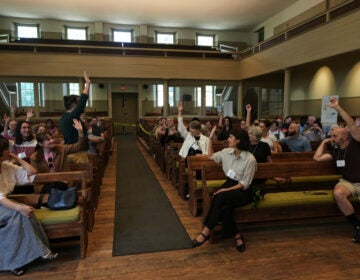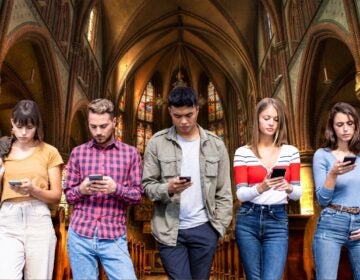Can a modern spin on a bar/bat mitzvah tradition keep teens in the Jewish community?
One Jewish community in Philadelphia tries to keep its young people rooted in their identity with a modern spin on a bar/bat mitzvah tradition.
Listen 2:03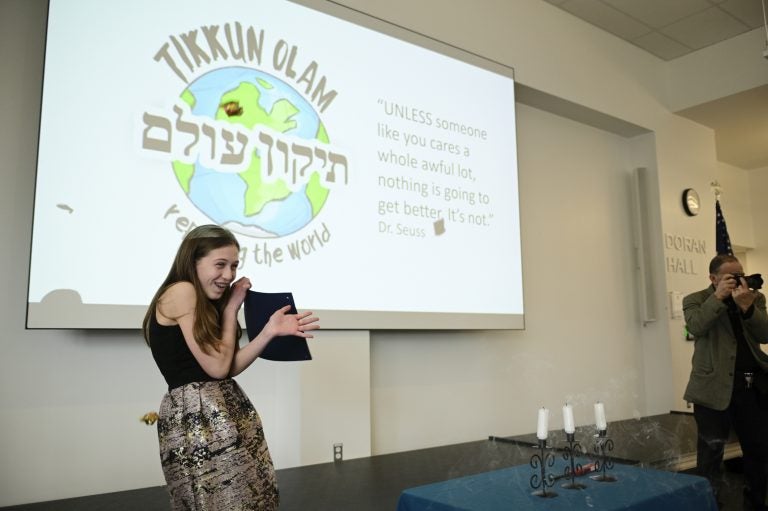
Sophie Mills braces for candy throws during her bat mitzvah ceremony at Jewish Children's Folkshul in Philadelphia. Family and friends gathered to see the seventh-grader give a presentation on five inspirational women who repaired the world. (Bastiaan Slabbers for WHYY)
Shelley Miller became a bat mitzvah in 1966. At the time, Jewish girls couldn’t read from the Torah — the first five books of the Hebrew bible — the way boys did during their coming-of-age ceremony, so she read three prayers chosen for her instead.
“When I was 13, no, it did not feel very meaningful,” said Miller of her ceremony.
That disconnect, for what’s supposed to be a very significant moment for Jewish youth, is not uncommon.
It’s one reason Miller helped standardize an alternative to the traditional bar and bat mitzvah at Jewish Children’s Folkshul, a secular humanist community in Philadelphia that embraces Jewish culture and lives by Jewish values.
And on Sunday morning, Miller watched as her 13-year-old granddaughter, Sophie Mills, took part in this alternative she helped establish in the region about 25 years ago, which she hopes will help young people feel more rooted to their cultural identity.
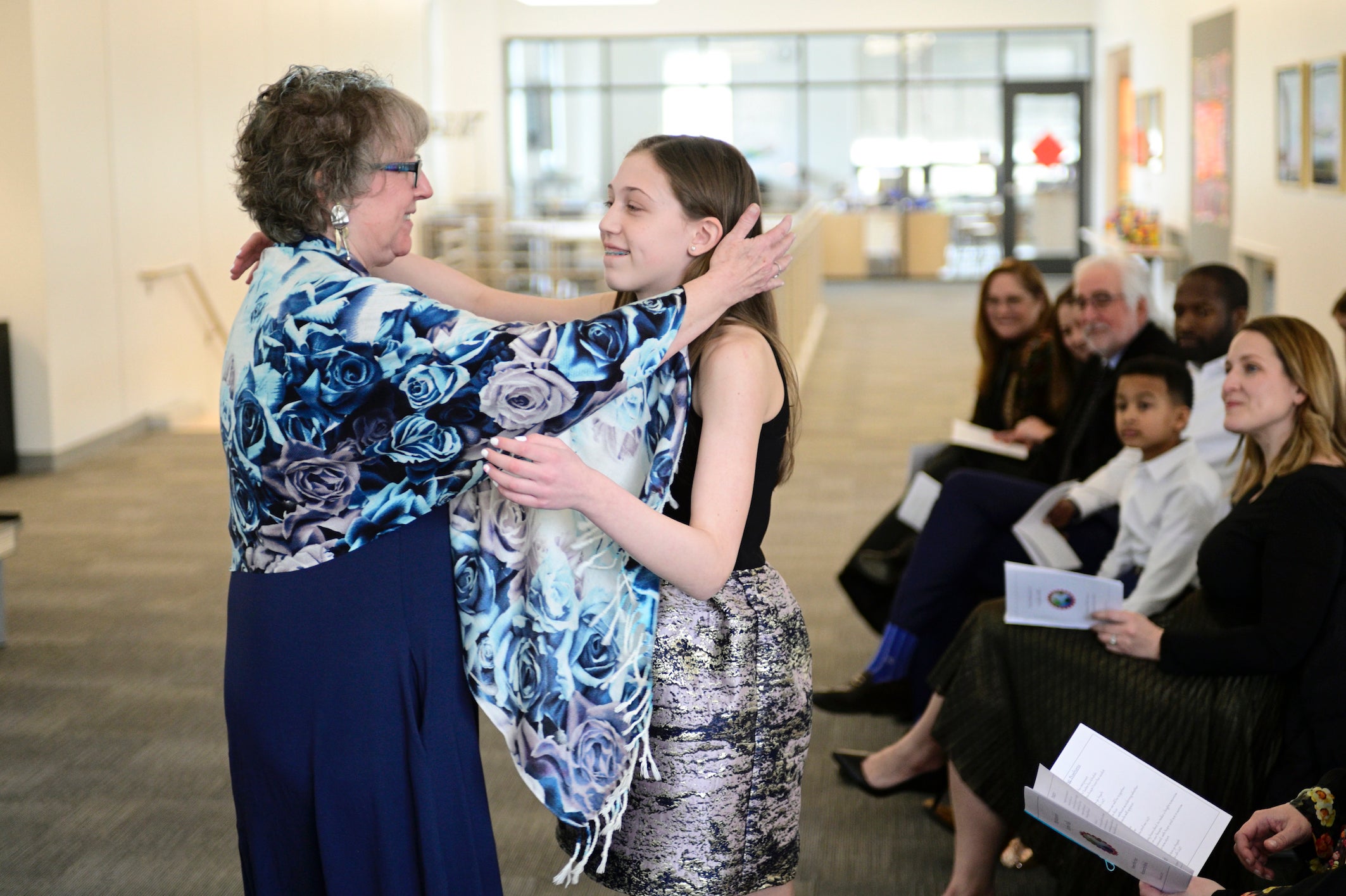
While there was some singing in Hebrew, Sophie didn’t have to memorize any assigned passages from the Torah, which is based on where in the Hebrew calendar the ceremony falls.
“Sometimes you could get lucky and get a nice story like the Noah’s Ark story and sometimes you could get stuck with a section from Leviticus that covers skin disease,” said Kate Forest, who led Sophie’s ceremony at Folkshul.
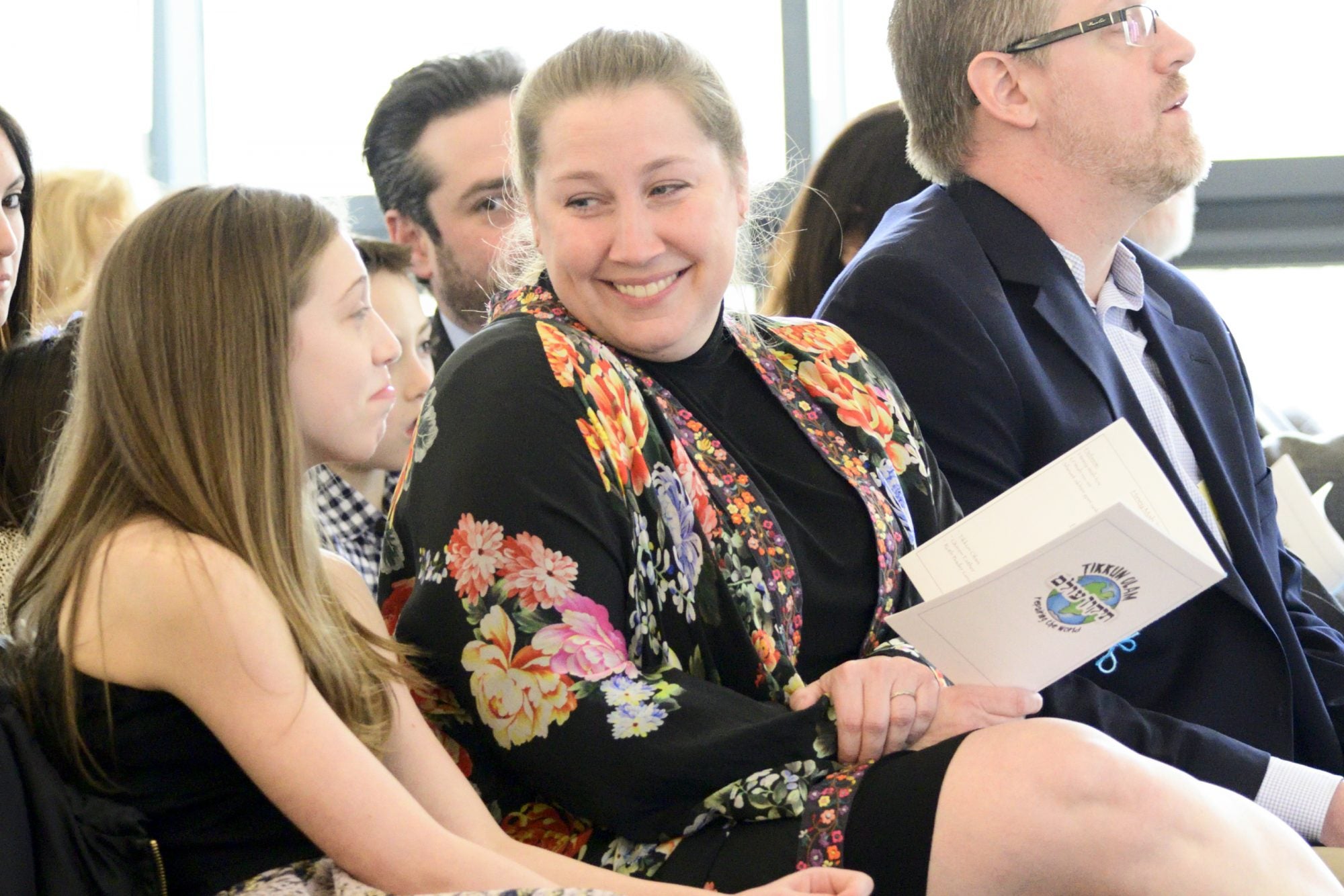
Time and time again, Forest said she’s seen young people who didn’t establish a deep connection to their Jewish identity during these crucial tween years distance themselves from the community.
In an effort to avoid disengagement, Folkshul lets children like Sophie skip the Torah portion and speak about a topic relating to Jewish life instead.
Each year, about a dozen Folkshul pre-teens spend months reading books, attending lectures related to their subject and writing about what they’ve learned. Past topics have included Jewish Pirates, the hidden art of Auschwitz and an attempt to answer the question “does God exist?”
The process still ends in a ceremony, except family and friends listen to a dissertation-like presentation about the young person’s year of study.
Sophie chose to explore the concept of tikkun olam (“repairing the world” in Hebrew) and six women of various faiths who spent their lives living by the principle, including U.S. Supreme Court Justice Ruth Bader Ginsberg, American professional soccer player and activist Megan Rapinoe, and Pakistani activist and Nobel Peace Prize laureate Malala Yousafzai.
Still, Sophie pointed out that a person doesn’t need to be famous to repair the world. She spoke of her beloved Aunt Mindy, a teacher who by all accounts lived her life doing acts of kindness — like bringing custodians and students treats when they had a bad day — before it was cut short by a tumor.
“I look up to those women who have helped make the world a better place and that’s the kind of person I want to be when I get older,” explained Sophie.
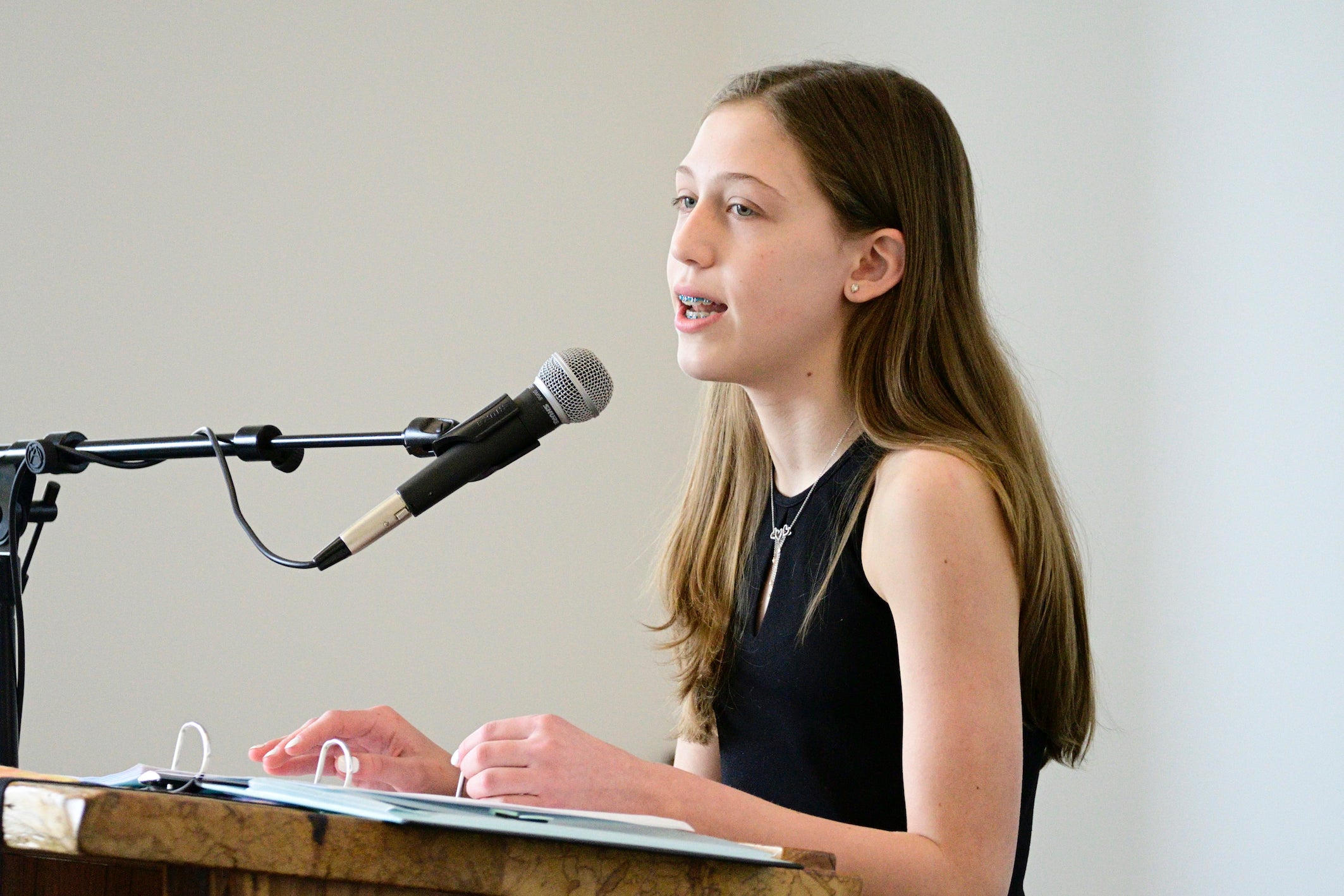
Lara Moretti was among the Folkshul community members who came to celebrate Sophie’s bat mitzvah and listened closely to what she had to say.
Her son Michael, who recently turned 13, will soon be speaking in front of a similar crowd on a topic of his choosing.
“He’s studying and researching, and when he finds things out he says, ‘Mom this is so cool,’” explained Moretti. “I don’t think I ever said anything was really cool about my bat mitzvah, so that’s a nice change to see that he’s excited about it.”
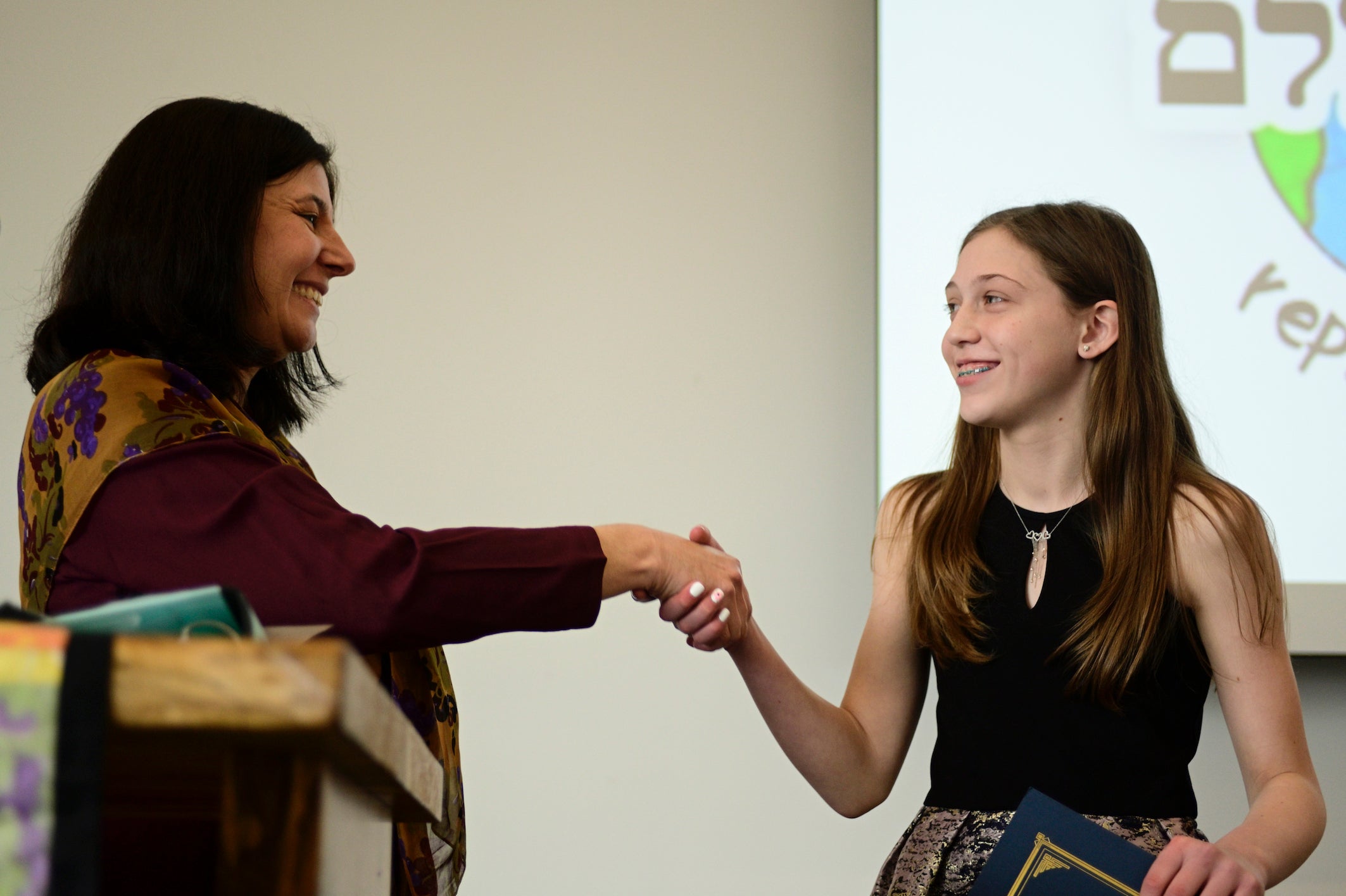
The fact that the ceremony is mostly in English makes for a more comfortable setting for interfaith families like hers, said Moretti.
Still, this approach to bar and bat mitzvahs isn’t universally embraced.
“We get a lot of times that this isn’t a ‘real’ bar mitzvah,” said Forest.
But like Sophie’s grandmother, Forest pointed out how Judaism’s different communities have changed over time. For instance, many girls can now have ceremonies and communities like Folkshul offer one that accommodates non-binary youth.
Rabbi Chaim Goldstein with Chabad at Drexel University echoed what other adults at Sophie’s ceremony said.
A ceremony with no deep connection often leaves young people asking: now what?
“There’s plenty of other ways to do the celebration and I feel like it’s more important for the boy or the girl to be able to express where they feel passionate,” said Goldstein, “if it’s reading from the Torah or if it’s talking about some topic in Judaism that they feel speaks to them.”
Bar and bat mitzvahs in his community, which is part of the orthodox movement, can read from the Torah, like he did when he was 13, but they don’t have to, and Goldstein believes a traditional or modern ceremony is fine if it gets teens to stick around.
According to Folkshul, their method results in 50 to 80% of students staying active in the Folkshul community throughout their high school years.
And while Sophie is young, with a lifetime to think about how she wants to express her Jewish identity, she said tikkun olam has really stuck with her.
“Even if you do a small act of kindness, it can still make a difference and help other people in smaller ways and inspire them to do good stuff,” said Sophie, after attendees showered her with candy, wishing her a sweet life.
WHYY is your source for fact-based, in-depth journalism and information. As a nonprofit organization, we rely on financial support from readers like you. Please give today.


